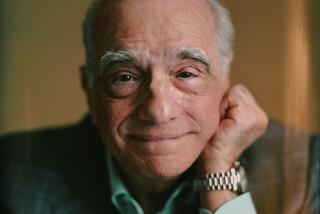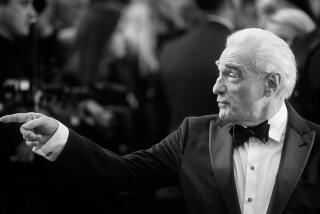FILM : The Not-So-GoodFellas Wander Scorcese’s ‘Mean Streets’
- Share via
Before the meaner streets of “GoodFellas,” there was just “Mean Streets,” Martin Scorcese’s look at a couple of wiseguys trying to push their way through New York’s urban sleaze.
The guys in “GoodFellas” are small-timers, but with a vision. Maybe they’ll get made (invited into the Mafia’s inner circle) or maybe they’ll whack somebody for a really big payoff. The guys in “Mean Streets” (screening at UC Irvine on Friday) are small-timers too, but without ambition. They’re not only small change, they’re loose change rolling aimlessly through the alleyways.
Johnny Boy (a charged-up Robert DeNiro) owes minor-league money to loan sharks all over town and blows up mailboxes for kicks. His pals run embarrassingly petty scams on kids wanting to buy sparklers and cherry bombs for the Fourth of July. Hey, what’s a guy to do when he doesn’t have the right connections? The mobsters in “GoodFellas” would just laugh.
“Mean Streets,” made in 1973, first showed Scorcese’s beautiful obsession with the low-lifes he saw crime-scavenging through New York’s tougher boroughs. The story of loser Johnny Boy and his protector Charlie (Harvey Keitel at his anxious best) is alive with affection: Scorcese lets his emotions, both friendly and not so friendly, instill the film with a juicy, comic realism.
“Mean Streets” also got Scorcese thinking about the next level up, where Mafiosi pulled the strings. After 17 years, the result is “GoodFellas,” not the operatic, majestically decadent world drawn in Coppola’s “The Godfather” series, but a de-mythologized vision where violence is as natural as giving the doorman a nice tip.
When you’re not turning away from the amorality, the gangsters in “GoodFellas” are hilarious and talk in that dirty city-jive Scorcese is known for, and the guys in “Mean Streets” are hilarious in the same ways. But their hearts are different; Johnny Boy, Charlie and the little hoods that hang around them don’t seem like they could pull off a hit--it’s a shock when one finally does at the film’s end.
Charlie, the only one with any hopes (he runs numbers but wants to own a restaurant), tries to remove himself from the bad influences choking in all around. He’s got a nice girlfriend (Amy Robinson), likes taking care of Johnny Boy, and he knows what guilt is. In a mood-setting scene just before the opening credits, Charlie lies in bed, thinking to himself: “You don’t make up for your sins in church, you do it at home, in the streets. . . .”
Too bad Johnny Boy is such a handful. DeNiro plays him like a street sprite who can’t control his dangerous side. He keeps inviting trouble wherever he goes; it’s like a curse. Keitel makes it clear that Charlie doesn’t know quite what to do, but he keeps on trying.
There’s a dignity (and a sad-funny hopelessness) in Charlie’s devotion, and it gives “Mean Streets” a kind of gutter nobility.
What: “Mean Streets.”
When: Friday, Oct. 5 at 7 and 9 p.m.
Where: UC Irvine’s Student Center Crystal Cove Auditorium, Campus Drive and Bridge Street, Irvine.
Whereabouts: San Diego Freeway to Jamboree Road and head south to Campus Drive. Head east to Bridge Street.
Wherewithal: $2 to $4.
Where to Call: (714) 856-5000.
More to Read
Only good movies
Get the Indie Focus newsletter, Mark Olsen's weekly guide to the world of cinema.
You may occasionally receive promotional content from the Los Angeles Times.









